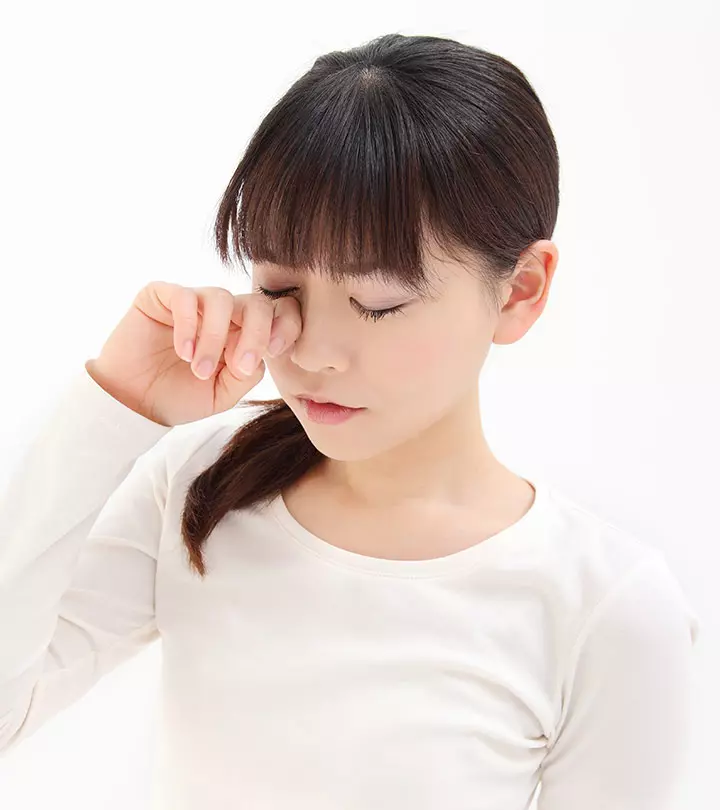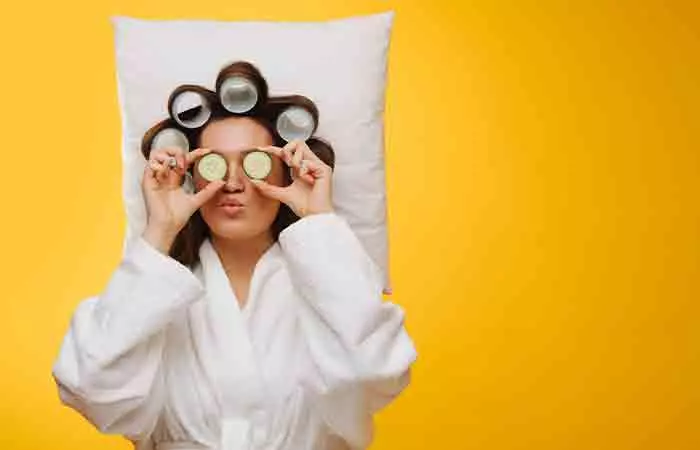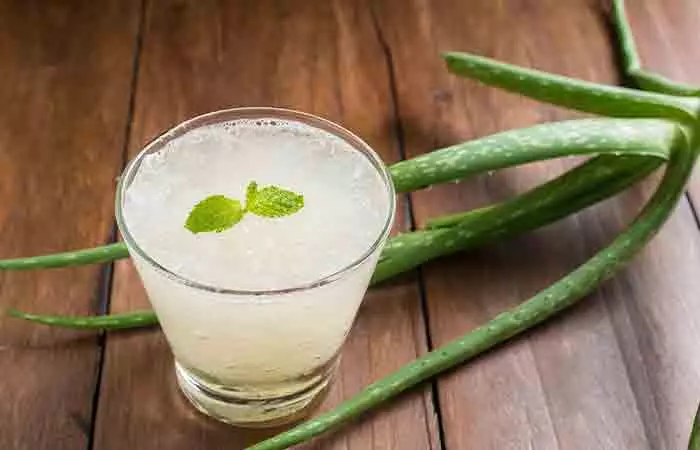13 Home Remedies For Itchy Eyes: Fast Relief Tips
Rubbing won't help; try some simple at-home treatments instead to ease the irritation and itch.

Image: Shutterstock
The changing weather conditions, dust, pollution, infection, or allergies can cause dryness which can lead to itchy eyes. Constant itching can be quite uncomfortable, making it difficult for you to maintain a clear vision and hampers your day-to-day activities. Fortunately, here are a couple of home remedies for itchy eyes. In this article, we explore some of the best natural remedies and simple tips you can use to reduce the risk of getting itchy eyes in the future. Scroll down for more information!
In This Article
What Is Eye Pruritus?
Eye pruritus, commonly known as itchy eyes, is a common ocular issue. It is a persistent itching in or around the eyes and is often linked to various causes, including allergies, dry eye syndrome, infections, or exposure to irritants. Symptoms may include redness, excessive tearing, and a burning or gritty sensation. Scratching itchy eyes may worsen the issue.
You can manage the issue by getting to its root cause. This may include using antihistamine eye drops for allergy-related itching, lubricating eye drops for dry eyes, or prescription medications for severe cases. Preventative measures include avoiding allergens and irritants, maintaining good eye hygiene, and safeguarding against environmental factors like dust and pollen. If symptoms persist or worsen, consult an eye care specialist for a precise diagnosis and suitable treatment.
Know about the causes and risk factors for itchy eyes in more detail in the next section.
Key Takeaways
- Itchy eyes or ocular pruritus occur due to dust, pollution, infection, allergies, or dry eye syndrome.
- Symptoms include redness or a burning sensation in the eyes.
- Cucumber slices, cold compress, tea bags, and castor oil are some of the effective home remedies for itchy eyes.
- Protection from UV rays and the proper use of contact lenses may prevent this condition.
Causes And Risk Factors For Itchy Eyes
This condition is also known as ocular pruritus (1). It can be caused by various factors, like allergies, infections, and a few underlying medical conditions.
The common causes of itchy eyes are:
- Dry Eye Syndrome: Occurs due to lack of hydration and lubrication in the eyes (2).
According to a study published in the Ophthalmic & Physiological Optics journal, it is a fairly common eye condition, with a global prevalence of 11.59% (9.5% in women and 6.8% in men), and the prevalence increasing with age. That means this condition affects around one in 11 people worldwide. It is the least prevalent in North America (4.6%) and the most prevalent in Africa (47.9%).
- Meibomian Gland Dysfunction: The meibomian glands are located in the upper and lower eyelids and secrete oil. Clogging or abnormal development of these glands may result in an insufficient amount of oil in tears. This may cause the tears to evaporate quickly and result in dry eyes and irritation (3).
- Blepharitis: Blepharitis is a condition that leads to inflammation of the eyelids. This condition is caused by staphylococcal bacteria or eyelid mites (4).
- Giant Papillary Conjunctivitis: This is an allergic reaction caused by contact lenses that results in itching (5).
- Contact Dermatitis: This is an inflammatory skin condition caused due to environmental conditions (6).
- Infectious Conjunctivitis: Infectious conjunctivitis is caused when eyes are infected by viral and bacterial infections.
The factors that can increase your risk of developing itchy eyes are:
- Dust, pollen, and animal dander
- Spending long periods in front of the computer without rest
- Advancing age
- Menopause
- Environmental conditions like dry air, air conditioning, and smoking
- Medical conditions like eczemai An inflammatory, itchy, red, and dry skin condition, often triggered by allergies, irritants, or environmental conditions. , psoriasisi An autoimmune skin disease that is persistent and causes rapid accumulation of skin cells, resulting in itching, redness, inflammation, and scaling. , and rosaceai A chronic skin disorder that typically affects the face and is characterized by redness, visible blood vessels, and occasionally lumps or pimples.
The condition is characterized by the following signs and symptoms.
Symptoms Of Itchy Eyes
- Itchy eyes
- Constant watering or dry eyes
- Swelling of the eyes
- Redness
- Sensitivity to light
- A burning sensation in the eyes
Itchy eyes may interfere with the day-to-day activities and need to be treated at the earliest. Here is a list of natural remedies that may help relieve the condition.
Home Remedies To Relieve Itchy Eyes
1. Cucumber Slices

Cucumber contains antioxidants (7). It has a soothing effect on skin irritations and reduces swelling (8). The cooling effect of cucumber may help ease the itching in your eyes.
You Will Need
A cucumber
What You Have To Do
- Cut a cucumber into round slices.
- Place the slices over closed eyes.
- Leave them on until they turn warm.
How Often You Should Do This
Do this 1-2 times daily.
2. Cold Compress
The topical use of ice compress helps in the delivery of oil from the meibomian glands
(9). It can also help soothe itching and irritation in the eyes.
You Will Need
An ice pack
What You Have To Do
- Place an ice pack on the affected eye.
- Leave it on for 1 or 2 minutes and take it off.
- Repeat 2 to 3 times.
How Often You Should Do This
Do this multiple times a day.
 Quick Tip
Quick Tip3. Tea Bags

The epigallocatechin gallate (EGCG)i A potent polyphenol and antioxidant present in green tea that has heart-protective, anti-inflammatory, and anti-cancer effects. present in green tea improves surface inflammation in dry eyes (10). Hence, the topical application of green tea bags may provide relief from itchy and dry eyes.
You Will Need
Used green tea bags
What You Have To Do
- Collect the tea bags used for making teas.
- Refrigerate them for 30 minutes.
- Place the chilled tea bags on your closed eyelids.
- Leave them on for 10 to 15 minutes and then remove.
How Often You Should Do This
Do this whenever your eyes start itching.
Note: You can use herbal teas of chamomile, calendula, and eyebright as a cold compress to relieve itchy eyes.
4. Cold Milk
Anecdotal reports suggest that cold milk acts as a cold compress. Thus, the topical application of cold milk may relieve itchiness and swelling in the eyes.
You Will Need
- 1 tablespoon of cold milk
- Cotton pads
What You Have To Do
- Dip a cotton pad in cold milk.
- Close the affected eye and place the soaked pad over it.
- Leave it on for about 10 minutes and then remove it.
- If you have an allergic reaction in your eyes, you can also add a pinch of turmeric to the milk.
How Often You Should Do This
Do this 2-3 times a day.
5. Water
Water cleanses the eyes and may soothe the irritation instantly.
You Will Need
Water
What You Have To Do
Wash your eyes with purified running water whenever they feel itchy.
How Often You Should Do This
Do this 2-3 times a day.
 Quick Tip
Quick TipCayla Wood, a YouTuber, experiences itchy eyes due to seasonal allergies, and so she shared her go-to method to instantly get rid of the irritation, stating, “All right, now you’re going to take the face cloth or washcloth and fold it in half…you want it to be in a nice neat square. Now you’re going to run it under some cold water. Now you don’t want the cloth to be soaking wet…. Alright, now you’re going to take the face cloth and dab it on your eyes, one at a time, until the itching stops. Now this should work pretty fast and effectively (i).”
6. Witch Hazel
Witch hazel (Hamamelis) possesses natural anti-inflammatory and astringent properties (11). Hence, it may help in alleviating itchiness and inflammation in the eyes.
You Will Need
- Witch hazel extract
- Cotton pads
What You Have To Do
- Soak cotton pads in witch hazel.
- Place them over closed eyelids.
- Remove the witch hazel compress after 10 to 15 minutes.
How Often You Should Do This
Do this 2 times a day.
7. Aloe Vera Juice

Aloe vera helps in soothing eye inflammation (12). Its topical application may help relieve symptoms associated with itchy eyes.
You Will Need
- Aloe vera juice
- Cotton balls
What You Have To Do
- Blend aloe vera juice.
- Refrigerate it for 30 minutes.
- Soak cotton balls in the juice.
- Place one over each eye.
- Leave them on for 10 to 15 minutes and remove.
How Often You Should Do This
Do this multiple times a day.
8. Castor Oil
Castor oil has a lubricant effect on the eyes (13). Hence, it may be a good option for treating itchy eyes.
You Will Need
- Organic castor oil
- Cotton balls
What You Have To Do
- Soak cotton balls with organic castor oil.
- Strain the excess oil and place the cotton balls on your closed eyelids.
- Leave them on for 15 minutes.
- Remove and wash your eyes with water.
How Often You Should Do This
Do this 1 to 2- times a day.
9. Potato
Anti-inflammatory therapies can help in treating dry and itchy eyes (14). The glycoalkaloidsi Naturally occurring toxic substances with potential medical uses present in plants like tomatoes and potatoes. present in potatoes exhibit such anti-inflammatory properties (15). Hence, the topical application of potatoes may help in reducing itchiness and swelling in the eyes. Potato contains omega-3 fatty acids that improve the functioning of the meibomian glands and produce oily tears.
You Will Need
A raw potato
What You Have To Do
- Refrigerate a raw potato.
- Cut it into circular slices and place one slice on each eye.
- Leave them for 15 minutes.
- Remove the slices.
How Often You Should Do This
Do this 2-3 times a day.
10. Rose Water
Rose water has anti-inflammatory and hydrating properties that can improve dry and inflamed eye conditions (16). Rose water may be used as an effective eyewash.
You Will Need
- Rosewater
- Cotton balls
What You Have To Do
- Place two cotton balls soaked with rose water on your eyes.
- Leave them on for 15 to 20 minutes and then remove them.
- Alternatively, one can use rose water as eye drops.
How Often You Should Do This
Do this 2-3 times a day.
11. Honey

Honey possesses anti-inflammatory and soothing properties (17). It is considered a therapeutic agent and used for treating eye diseases (18).
You Will Need
1 teaspoon of organic honey
What You Have To Do
- Apply organic honey under your eyelids.
- Leave it on for 20 minutes and rinse it off.
- Alternatively, you can put a drop of honey in your eyes.
How Often You Should Do This
Do this 2 times a day.
12. Essential Oils
a. Lavender Oil
Lavender oil has anti-inflammatory and analgesic properties (19). These properties may help soothe itchy and inflamed eyes.
You Will Need
- 4 drops of lavender oil
- 1 teaspoon of coconut oil (Carrier oil)
What You Have To Do
- Mix four drops of lavender oil with a teaspoon of coconut oil.
- Apply the mixture gently under the eyes and around the eyelids.
- Leave it on for 10 to 15 minutes and wash it off.
How Often You Should Do This
Do this 1-2 times a day.
b. Tea Tree Oil

Tea tree oil possesses anti-inflammatory and antimicrobial properties (20). These properties may offer immediate relief from itchy eyes.
You Will Need
- 3-4 drops of tea tree oil
- 1 teaspoon of coconut oil (Carrier oil)
What You Have To Do
- Add three to four drops of tea tree oil to a teaspoon of coconut oil.
- Mix well and apply it all around your eyes.
- Leave it on for 20 minutes and rinse it off.
How Often You Should Do This
Do this 2 times a day.
13. Vitamins
The deficiency of a few nutrients may aggravate the symptoms of itchy eyes. Vitamins A, C, and E are important for the proper functioning of your eyes. Individuals with itchy eyes usually have a vitamin A deficiency (21). Vitamins C and E are beneficial for the overall health of the eyes and may be used to reverse many eye infections (22), (23).
You Will Need
Citrus fruits, green leafy vegetables, carrots, turnips, kale, mangoes, and cheese.
What You Have To Do
Consume these vitamin-rich foods.
How Often You Should Do This
Consume these foods often.
While these remedies help reduce itching in your eyes, there are high chances of its recurrence if you do not follow these prevention tips.
Prevention Tips
- Protect your eyes from direct sunlight and allergens by always wearing a pair of sunglasses.
- Do not wear contact lenses for long durations.
- Drink plenty of water to keep yourself hydrated.
- Avoid rubbing your eyes.
- Flush your eyes with cold water every now and then.
- Identify and reduce exposure to common allergens, such as mold, dust, pollen, and pet dander.
- Keeping indoor humidity levels high helps keep the eyes hydrated, since dry air may cause eye irritation.
- Reduce digital eye strain by following the 20-20-20 rule. Every 20 minutes, look at something 20 feet away for 20 seconds.
- Close your eyes and apply a cold wash cloth to them to relieve discomfort and reduce inflammation.
Moreover, itchy eyes tend to turn red. So, in case you notice any redness and puffiness you may try home remedies for red eyes as they may soothe the redness and irritation and relieve any other discomfort.
When To Seek Medical Attention
While home remedies may offer relief for itchy eyes, it is important to know when a professional’s care is necessary. If you notice symptoms such as sudden or partial vision loss, intense or prolonged eye pain, persistent redness that does not subside, or unusual discharge, you need to see a doctor immediately. These signs may indicate a more serious underlying issue that home treatments can not resolve.
Infographic: Prevention Tips To Avoid The Risk Of Itchy Eyes
Various factors can trigger itchy eyes and lead to pain and discomfort. While you can always take eye drops to soothe the symptoms, a few precautions and changes in your daily hygiene routine may help avoid the symptoms. Check the infographic below to learn the best practices to avoid the risk of getting itchy eyes.
Some thing wrong with infographic shortcode. please verify shortcode syntax
Constant itching of the eyes can be uncomfortable, making it difficult to maintain a clear vision. Dry eye syndrome, meibomian gland dysfunction, blepharitis, and giant papillary conjunctivitis can cause itchy eyes. In addition, dust, pollen, animal dander, advancing age, and various environmental and medical conditions can aggravate itchy eyes. Watering or dry eyes, swelling, redness, sensitivity to light, and a burning sensation in the eyes are its symptoms. Follow the home remedies mentioned above to get rid of itchy eyes. Even a deficiency of vitamins, such as vitamin E, might cause itchy eyes. However, if you don’t see any improvement in the condition even after trying the home remedies, consult your doctor immediately.
Frequently Asked Questions
When to see a doctor for itchy eyes?
You must see a doctor if you experience:
- Sudden eye pain
- Vision loss
- Pain
- Visual changes
- Bulging eyes
- Signs of infection
- Too much of tearing
What are the best eye drops for itchy eyes?
Itchy eyes are a common symptom of allergies, and in such cases, medications like antihistamine eye drops can help. However, consult a doctor and take medicines only written in the prescription.
How long does it take for an eye irritation to go away?
Normal itching in the eyes usually fades after a good night’s sleep. However, if the itching is due to an underlying infection, it may take one to two weeks to notice an improvement in your condition.
What happens if you rub your eyes too much?
Rubbing your eyes too much can cause micro-scratches on the cornea of your eye and damage it. In the short term, you may experience sensitivity to light, watery eyes, and redness from rubbing your eyes too much. In the long run, the cornea may get infected or develop scar tissue and seriously impact your vision.
Personal Experience: Source
StyleCraze's articles are interwoven with authentic personal narratives that provide depth and resonance to our content. Below are the sources of the personal accounts referenced in this article.
i. How To Instantly Relieve Itchy/Irritated Allergy Eyes!!https://www.youtube.com/watch?v=HmJzTls46ms
References
Articles on StyleCraze are backed by verified information from peer-reviewed and academic research papers, reputed organizations, research institutions, and medical associations to ensure accuracy and relevance. Read our editorial policy to learn more.
- Stull, Carolyn et al. “The prevalence and characteristics of chronic ocular itch: a cross-sectional survey.” Itch (Philadelphia, Pa.) vol. 2,1 (2017): e4.
https://www.ncbi.nlm.nih.gov/pmc/articles/PMC5965304/ - Javadi, Mohammad-Ali, and Sepehr Feizi. “Dry eye syndrome.” Journal of ophthalmic & vision research vol. 6,3 (2011): 192-8.
https://www.ncbi.nlm.nih.gov/pmc/articles/PMC3306104/ - Driver, Paul J., and Michael A. Lemp. “Meibomian gland dysfunction.” Survey of ophthalmology 40.5 (1996): 343-367.
https://www.sciencedirect.com/science/article/abs/pii/S0039625796800646 - McCulley, James P., Joel M. Dougherty, and David G. Deneau. “Classification of chronic blepharitis.” Ophthalmology 89.10 (1982): 1173-1180.
https://www.sciencedirect.com/science/article/abs/pii/S0161642082346692 - Allansmith, Mathea R., et al. “Giant papillary conjunctivitis in contact lens wearers.” American journal of ophthalmology 83.5 (1977): 697-708.
https://www.ajo.com/article/0002-9394(77)90137-4/pdf - Usatine, Richard P, and Marcela Riojas. “Diagnosis and management of contact dermatitis.” American family physician vol. 82,3 (2010): 249-55.
https://pubmed.ncbi.nlm.nih.gov/20672788/ - Kumar, D et al. “Free Radical Scavenging and Analgesic Activities of Cucumis sativus L. Fruit Extract.” Journal of young pharmacists : JYP vol. 2,4 (2010): 365-8.
https://www.ncbi.nlm.nih.gov/pmc/articles/PMC3019374/ - Mukherjee, Pulok K et al. “Phytochemical and therapeutic potential of cucumber.” Fitoterapia vol. 84 (2013): 227-36.
https://pubmed.ncbi.nlm.nih.gov/23098877/ - Nagymihályi, Attila, Shabtay Dikstein, and John M. Tiffany. “The influence of eyelid temperature on the delivery of meibomian oil.” Experimental eye research 78.3 (2004): 367-370.
https://www.sciencedirect.com/science/article/pii/S0014483503001970 - Nejabat, Mahmood et al. “Efficacy of Green Tea Extract for Treatment of Dry Eye and Meibomian Gland Dysfunction; A Double-blind Randomized Controlled Clinical Trial Study.” Journal of clinical and diagnostic research : JCDR vol. 11,2 (2017): NC05-NC08.
https://www.ncbi.nlm.nih.gov/pmc/articles/PMC5376801/ - Thring, Tamsyn Sa et al. “Antioxidant and potential anti-inflammatory activity of extracts and formulations of white tea, rose, and witch hazel on primary human dermal fibroblast cells.” Journal of inflammation (London, England) vol. 8,1 27.
https://www.ncbi.nlm.nih.gov/pmc/articles/PMC3214789/ - Woźniak, Anna, and Roman Paduch. “Aloe vera extract activity on human corneal cells.” Pharmaceutical biology 50.2 (2012): 147-154.
https://www.researchgate.net/publication/221835842_Aloe_vera_extract_activity_on_human_corneal_cells - Goto, Eiki et al. “Low-concentration homogenized castor oil eye drops for noninflamed obstructive meibomian gland dysfunction.” Ophthalmology vol. 109,11 (2002): 2030-5.
https://pubmed.ncbi.nlm.nih.gov/12414410/ - Stern, Michael E., and Stephen C. Pflugfelder. “Inflammation in dry eye.” The ocular surface 2.2 (2004): 124-130.
https://www.sciencedirect.com/science/article/abs/pii/S1542012412701489 - Kenny, Olivia M., et al. “Anti-inflammatory properties of potato glycoalkaloids in stimulated Jurkat and Raw 264.7 mouse macrophages.” Life sciences 92.13 (2013): 775-782.
https://www.sciencedirect.com/science/article/abs/pii/S0024320513000982 - Boskabady, Mohammad Hossein et al. “Pharmacological effects of rosa damascena.” Iranian journal of basic medical sciences vol. 14,4 (2011): 295-307.
https://www.ncbi.nlm.nih.gov/pmc/articles/PMC3586833/ - Owoyele, Bamidele Victor et al. “Analgesic and anti-inflammatory effects of honey: the involvement of autonomic receptors.” Metabolic brain disease vol. 29,1 (2014): 167-73.
https://pubmed.ncbi.nlm.nih.gov/24318481/ - Majtanova, Nora, Martin Cernak, and Juraj Majtan. “Honey: a natural remedy for eye diseases.” Complementary Medicine Research 23.6 (2016): 364-369.
https://karger.com/fok/article-abstract/23/6/364/356895/Honey-A-Natural-Remedy-for-Eye-Diseases?redirectedFrom=fulltext - Silva, Gabriela L da et al. “Antioxidant, analgesic and anti-inflammatory effects of lavender essential oil.” Anais da Academia Brasileira de Ciencias vol. 87,2 Suppl (2015): 1397-408.
https://pubmed.ncbi.nlm.nih.gov/26247152/ - Carson, C F et al. “Melaleuca alternifolia (Tea Tree) oil: a review of antimicrobial and other medicinal properties.” Clinical microbiology reviews vol. 19,1 (2006): 50-62.
https://www.ncbi.nlm.nih.gov/pmc/articles/PMC1360273/ - Lee, Matthew Hao et al. “Vitamin A Deficiency Presenting with ‘Itchy Eyes’.” Case reports in ophthalmology vol. 6,3 427-34.
https://www.ncbi.nlm.nih.gov/pmc/articles/PMC4777935/ - Cho, Yong-Wun et al. “Efficacy of systemic vitamin C supplementation in reducing corneal opacity resulting from infectious keratitis.” Medicine vol. 93,23 (2014): e125.
https://www.ncbi.nlm.nih.gov/pmc/articles/PMC4616340/ - Rasmussen, Helen M, and Elizabeth J Johnson. “Nutrients for the aging eye.” Clinical interventions in aging vol. 8 (2013): 741-8.
https://www.ncbi.nlm.nih.gov/pmc/articles/PMC3693724/
Read full bio of Dr. Jennifer Tsai
Read full bio of Sucharita Mishra
Read full bio of Arshiya Syeda
Read full bio of Dipti Sharma


























Community Experiences
Join the conversation and become a part of our empowering community! Share your stories, experiences, and insights to connect with other beauty, lifestyle, and health enthusiasts.